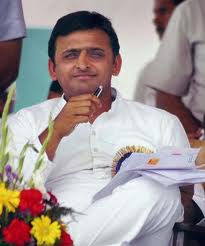 Lucknow, May 12: In a decision of far-reaching political consequences, the Akhilesh Yadav government on Friday scrapped 26 programmes and schemes of the Mayawati regime, replaced the Ambedkar Gram Sabha Vikas Yojana (AGSVY) with a project named after the Samajwadi Party ideologue, Ram Manohar Lohia, and ended the quota system in government contracts.
Lucknow, May 12: In a decision of far-reaching political consequences, the Akhilesh Yadav government on Friday scrapped 26 programmes and schemes of the Mayawati regime, replaced the Ambedkar Gram Sabha Vikas Yojana (AGSVY) with a project named after the Samajwadi Party ideologue, Ram Manohar Lohia, and ended the quota system in government contracts.
All these populist measures were launched by the former Uttar Pradesh Chief Minister, Mayawati. Some of these, such as the Manyavar Kanshi Ram Green (Eco) Garden Project in Lucknow, the Kanshi Ram Shahri Gharib Awas Yojana, the Mahamaya Gharib Balika Aashirvad Yojana, the Savitri Bai Phule Balika Shiksha Madad Yojana and the Dr. Ambedkar Gram Sabha Vikas Yojana were named after Dalit icons and were Ms. Mayawati's ambitious projects.
The decision to do away with the projects was taken at a Cabinet meeting presided over by Chief Minister Akhilesh Yadav on Friday.
The implementation of the 26 programmes and schemes of the previous regime was being handled by 13 government departments, including Housing, Rural Development, Secondary Education, Energy, Minority Welfare, Social Welfare and Public Works. At the same time, the departments have been told to complete the incomplete works of these schemes and clear the existing dues before issuing closure orders.
According to an official spokesman, the decision to finish the 26 projects will enable the government to save Rs.4,861.72 crore. The money saved will be utilised in the implementation of new priority schemes of the present government.
The Akhilesh Yadav Cabinet further decided to launch a rural integrated development programme after Dr. Lohia. The scheme named the Dr. Ram Manohar Lohia Samagra Gram Vikas Yojana, will replace the AGSVY and the Samagra Gram Vikas Yojana. The last two schemes have ceased to exist.
Thirty-six development programmes of 22 departments have been identified for implementation under the Dr. Lohia scheme. The yardstick for their implementation has also been fixed. Under the scheme, 10,000 villages will be saturated in the next five years. While the development of 1,600 villages will be taken up in the 2012-13 financial year in the remaining period of the scheme each year, 2,100 villages will be taken up for development. The development works will include construction of approach roads, rural electrification, clean toilets, potable water, construction of schools, the Mahatma Gandhi National Rural Employment Guarantee Scheme, distribution of tablets and laptops, health centres, unemployment allowance, old-age pension and kisan credit cards.
The move to end the quota system in government contracts was taken in public interest and to infuse competitiveness, as well as to ensure the quality of construction works and provide an open field to all bidders, the spokesman said.
Reservation for Scheduled Castes and the Scheduled Tribes contractors in government construction works up to Rs.5 lakh was introduced by the Mayawati government through a government order dated June 30, 2009. The quota fixed was 21 per cent for SC contractors and 2 per cent for those belonging to the STs. Subsequently, another GO had been issued on January 29, 2010, which raised the limit from Rs. 5 lakh to Rs. 25 lakh.





Comments
Add new comment